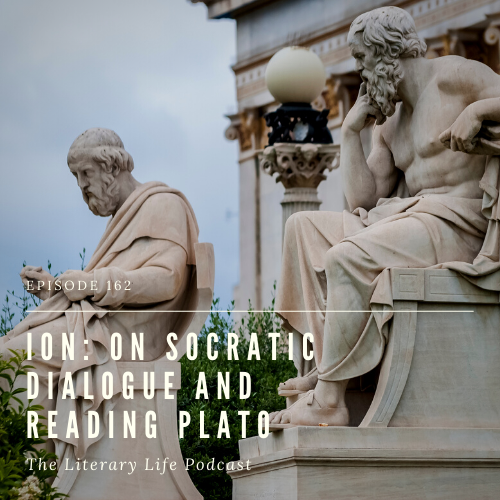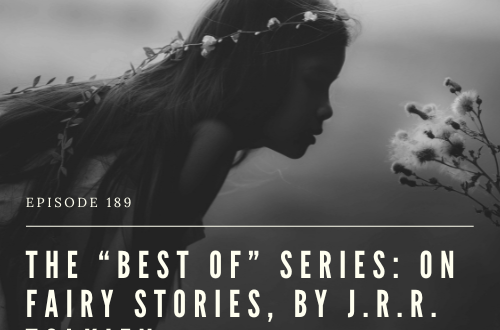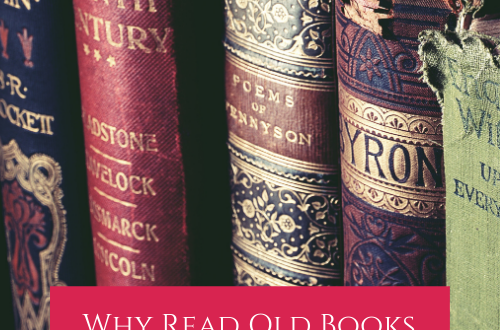
Episode 162: “Ion” – On Socratic Dialogue and Reading Plato
Welcome to this week’s episode of The Literary Life Podcast with Angelina Stanford, Cindy Rollins, and Thomas Banks. This week our hosts share their discussion of Plato’s Ion. This episode serves as an introduction on how to read Plato as well as an opportunity to consider what Socratic dialogue is and is not. Thomas gives some background on Plato as a person as well as his writing of dialogues. Angelina shares her thoughts on why the term “Socratic method” as it is used today is not actually a good teaching technique.
In talking about the text of Ion, Thomas explains what a “rhapsode” is and lets us know that this piece of dialogue is supposed to be humorous, rather satirical in nature. Another background topic related to the conversation is the ancient idea of atheism in contrast to our modern definition. To wrap up, Thomas gives a few suggestions for continuing your reading of Plato.
Register now for our 5th Annual Literary Life Online Conference coming up April 12-15, 2023, Shakespeare: The Bard for All and for All Time. Get all the details and sign up today at houseofhumaneletters.com.
Listen Now:
Commonplace Quotes:
The job of a Christian parent is not to produce godly children. The job of the Christian parent is to be a godly parent.
Christopher Yuan
A few people have ventured to imitate Shakespeare’s tragedy. But no audacious spirit has dreamed or dared to imitate Shakespeare’s comedy. No one has made any real attempt to recover the loves and the laughter of Elizabethan England. The low dark arches, the low strong pillars upon which Shakespeare’s temple rests we can all explore and handle. We can all get into his mere tragedy; we can all explore his dungeon and penetrate into his coal-cellar; but we stretch our hands and crane our necks in vain towards that height where the tall turrets of his levity are tossed towards the sky. Perhaps it is right that this should be so; properly understood, comedy is an even grander thing than tragedy.
G. K. Chesterton, from Illustrated London News, April 27, 1907
Nothing stands still for us. This is our normal state, albeit the one most contrary to our proper inclination
Blaise Pascal
The Fall of a Soul
by John Addington Symonds
I sat unsphering Plato ere I slept:
Then through my dream the choir of gods was borne,
Swift as the wind and splendid as the morn,
Fronting the night of stars; behind them swept
Tempestuous darkness o’er a drear descent,
Wherein I saw a crowd of charioteers
Urging their giddy steeds with cries and cheers,
To join the choir that aye before them went:
But one there was who fell, with broken car
And horses swooning down the gulf of gloom;
Heavenward his eyes, though prescient of their doom,
Reflected glory like a falling star,
While with wild hair blown back and listless hands
Ruining he sank toward undiscover’d lands.
Books Mentioned:
Phaedrus by Plato
Othello by William Shakespeare
Out of a Far Country by Angela Yuan and Christopher Yuan
The Soul of Wit by G. K. Chesterton, edited by Dale Ahlquist
Pensées by Blaise Pascal
Five Dialogues by Plato
Selected Myths by Plato
Support The Literary Life:
Become a patron of The Literary Life podcast as part of the “Friends and Fellows Community” on Patreon, and get some amazing bonus content! Thanks for your support!
Connect with Us:
You can find Angelina and Thomas at HouseofHumaneLetters.com, on Instagram @angelinastanford, and on Facebook at https://www.facebook.com/ANGStanford/
Find Cindy at morningtimeformoms.com, on Instagram @cindyordoamoris and on Facebook at https://www.facebook.com/cindyrollins.net/. Check out Cindy’s own Patreon page also!
Follow The Literary Life on Instagram, and jump into our private Facebook group, The Literary Life Discussion Group, and let’s get the book talk going! http://bit.ly/literarylifeFB
Subscribe to The Lit Life:









One Comment
Allison
Unfortunately, this episode was very isolating to those who are listening who are not homeschool moms. Some people who listen to the podcast cannot afford to homeschool. In my case, we send our children to a wonderful Classical Christian school (I do wonder if the Catholic or non-reformed classical schools do in fact have the problems they discuss in the episode, but ours does not). My husband is a music teacher in our classical school and I doubt most homeschool moms can teach music like he does (no offense meant, but that is a very niche area)! The recent episodes have been very critical of anything classical education although I consider the Charlotte Mason method more similar to classical education than the current progressive/public school education. Can we acknowledge the similarities rather than the differences? For example, the “Socratic method” that they vilify in this episode: do they really believe every class taught in classical schools is done in this way? No! Of course not! Lectures are the primary form of education but allowing students to discuss after having learned the material is an effective way of promoting skills useful in the future. Classical schools, according to the studies, produce children who are more capable of engaging with the world and defending their positions than either their homeschooled or public schooled cohorts. My daughter, in second grade, reads classic children’s literature in school, not the drivel that public schools recommend. I am not suggesting that homeschooling cannot be equally as effective, but when your options are classical school vs traditional public (or evangelical Christian) school, then classical Christian education will win out every time.